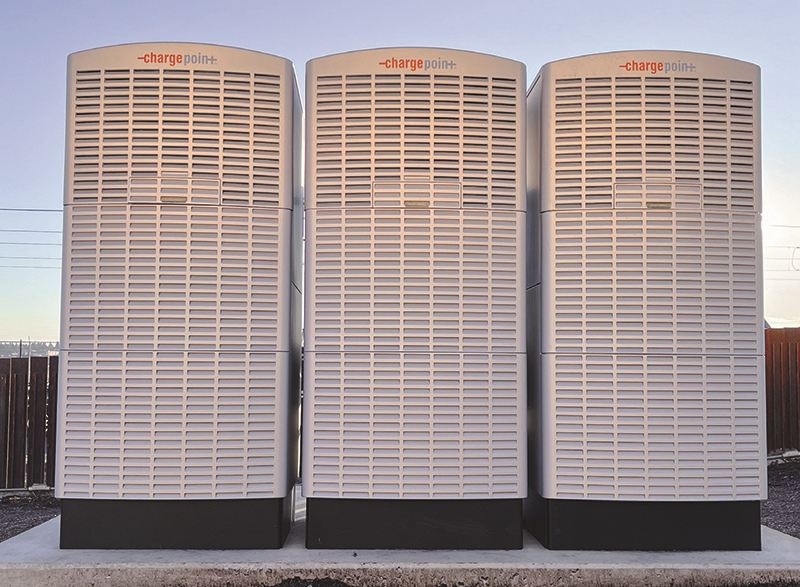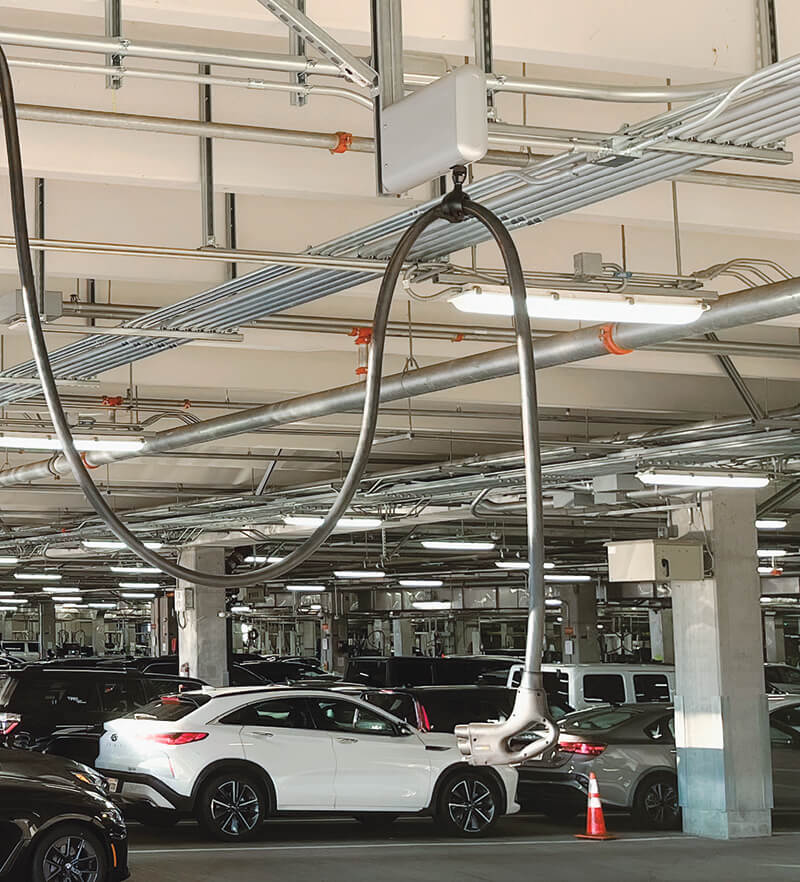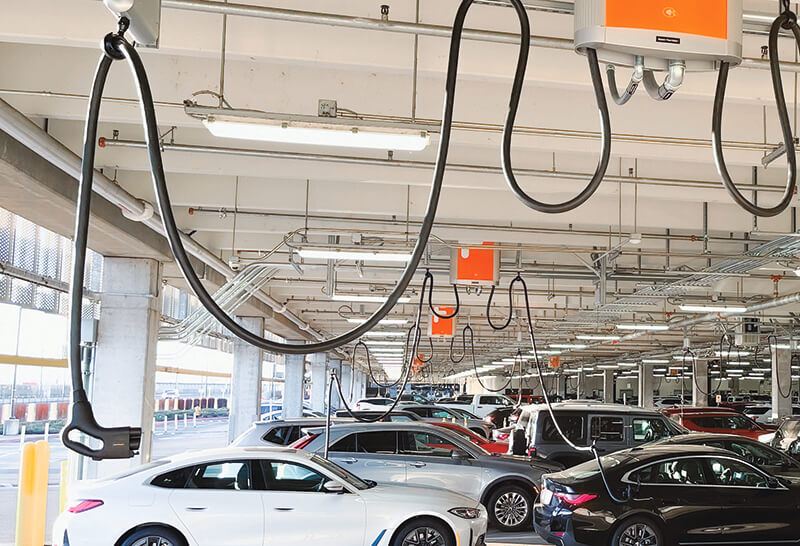In its ideal state, electricity travels at the speed of light. But actually, moving high voltage power from one point to another is rarely a quick or simple process—especially at a bustling airport.
Portland International Airport (PDX) understands that challenge firsthand. Demand for electrical connectivity is skyrocketing at the Oregon gateway as rental car companies add more electric vehicles to their inventories. And while the airport’s consolidated rental car center is relatively new, it previously lacked the means to quickly recharge electric vehicles after customers returned them.
That all changed in December when PDX unveiled one of the nation’s first common-use, direct current fast charger system inside an airport rental car quick turnaround area. The $3.3 million improvement charges electric vehicles in just a couple hours—up to eight times faster than a common Level 2 charger.
| facts&figures
Project: Fast Charging Equipment in Rental Car Location: Portland Int’l Airport, in OR Cost: $3.3 million Funding: Rental car consortium paid for project, with reimbursement from airport through customer facility charges ($6/day on all rental contracts of 10 days or less) Completed: Dec. 2024 General Contractor: ENGIE Services U.S. Inc.* Project Management: Conrac Solutions Charging Equipment Provider: ChargePoint Engineering: Coffman Engineers Electrical Contractor: Tice Electric Car Rental Brands: Alamo, Avis, Budget, Dollar, Enterprise, Hertz, National, Payless, SIXT, Thrifty, Zipcar 2024 Airport Passengers: 17.5 million Owner/Operator: Port of Portland Of Note: 1st U.S. airport to install fast charging stations for electric rental vehicles |
That, in turn, reduces the time it takes for rental car companies to place arriving customers into those vehicles, particularly during peak periods when wasted time leads to lost revenue.
“The best rental experience is one that just works—you get the car you want, enjoy your trip and return it without a hassle,” says Jeremiah Hartley, airport rental car manager for the Port of Portland. “The more that process fades into the background, the better.”
Keep Portland Wired
PDX is home to a mix of nearly 20 U.S. and foreign flag air carriers that collectively served more than 17.5 million passengers last year, up 6.3% over 2023. It’s owned and operated by the Port of Portland, which also runs three active marine terminals and the nearby Hillsboro and Troutdale airports that cater to general aviation, corporate and flight training clientele.
True to its multimodal nature, the Port recognizes the importance of choices for accessing its flagship airport. While the municipally operated MAX Red Line provides light rail service between PDX and cities of Portland, Beaverton and Hillsboro, the airport also heavily relies on 11 car rental brands housed within a combined public parking garage and consolidated rental car center that opened in 2021. An adjacent common-use quick turnaround area for cleaning, maintaining and refueling rental cars came online in 2018.
For years, PDX has offered Level 1 and Level 2 electric vehicle chargers in its public garages, but there initially wasn’t a cohesive program for charging infrastructure, including within the rental car facilities. Ideas were considered, but value engineering generally prevailed when the airport was adding new infrastructure because rental car companies had not shown a significant commitment to using electric vehicles.
That mindset flipped shortly after PDX opened its consolidated rental car center. In October 2021, Hertz announced plans to purchase 100,000 new electric Teslas. Hartley learned that PDX would receive 300 of them over the next six months.
Avis, another rental mainstay, was simultaneously preparing to boost its electric fleet—without any onsite charging options in place for PDX’s rental car providers. An off-airport Tesla Supercharger location nearby soon became the de facto electric power provider for both rental companies.
“You’d see them taking cars over there every morning,” Hartley recalls.
More fuel was added to the brewing electrical firestorm in late 2022, when Oregon’s Environmental Quality Commission passed laws similar to those in California. The recent legislation requires all light-duty vehicles purchased in Oregon after 2035 to be electric or hybrid. To be sure, a clock was ticking at PDX.
“At that point, we realized our (infrastructure) wouldn’t be sufficient going forward,” Hartley says.
The airport assembled a team to rectify the problem. It quickly identified available electrical circuits to support Level 2 chargers in the ready return area. But the most acute need—and a most fortuitous opportunity—resided within the quick turnaround area. That’s where there were 1,600 untapped amps of electrical connectivity left over from abandoned plans to install high-pressure air blowers for drying rental vehicles as they exited the automated car washes. The existing electric service offered enough energy to power 10 fast chargers, each with two cable connections.
“Upon completion of charging the first vehicle, the system automatically starts charging the second vehicle that is plugged in,” Harley explains.
Today, electric rentals returned by customers are wired up to any of the 20 stations for as long as needed. Some can charge from 0% to 70% battery capacity in as little as 40 minutes. When new customers need the vehicles, they’re washed, vacuumed and driven from the quick turnaround center to the ready return building, where attendants briefly reconnect them to slower Level 2 chargers to top off their power supplies.
“The combination of those two charging options makes us most efficient,” Hartley explains.
 Tom Kennedy, president of SIXT North America, commends the airport for its commitment to sustainability and investment in green infrastructure. SIXT is one of three brands currently using the fast chargers at PDX, and Kennedy is confident the airport’s efforts will pay off as interest in electric vehicles gains momentum at U.S. airports in coming years.
Tom Kennedy, president of SIXT North America, commends the airport for its commitment to sustainability and investment in green infrastructure. SIXT is one of three brands currently using the fast chargers at PDX, and Kennedy is confident the airport’s efforts will pay off as interest in electric vehicles gains momentum at U.S. airports in coming years.
“We are closely tracking this important trend,” says Kennedy, whose company rents BMW and other premium electric vehicle models at PDX. “As customer demand continues to grow, we welcome the opportunity to expand the number of electric vehicles in our fleet, both at our Portland International Airport branch and in other key markets where demand is strongest.”
Trail Blazers
As the Port of Portland developed the airport’s consolidated car rental center nearly a decade ago, its consortium of vendors hired Conrac Solutions to manage the new shared facilities. Based near Seattle, the company oversees car rental operations at PDX and 16 other airports.
Conrac Solutions, which is owned by the sustainability-focused global investor and asset manager Meridiam, managed the fast charger project and brought on Oakland-based ENGIE Services U.S. Inc.* as a consultant. After conducting onsite assessments and developing the work scope and construction price estimates, it transitioned into the role of general contractor once its formal project proposal was accepted.

The units that deliver power to charging stations are located away from vehicle circulation areas.
ENGIE then hired two Portland-based firms as key subcontractors: Coffman Engineers for assistance with drawings and planning approvals, and Tice Electric for all electrical work. ChargePoint, a Silicon Valley manufacturer that specializes in electric vehicle charging, was selected to provide and commission the new equipment.
 Scott Anderson, managing director of Conrac Solutions Operators, says his firm’s experience tackling similar challenges at other airports made the rental car consortium comfortable with its ability to deliver needed improvements at PDX.
Scott Anderson, managing director of Conrac Solutions Operators, says his firm’s experience tackling similar challenges at other airports made the rental car consortium comfortable with its ability to deliver needed improvements at PDX.
The first step was a thorough needs assessment for the near term and beyond. “We started trying to understand what the energy demand might look like based on milestones such as 2% of a fleet, 5% of a fleet going electric, and so on,” Anderson says.
To future-proof the project, extra conduit was buried during the initial buildout. Now, PDX can effectively double or triple its current charging capacity by tapping into additional off-site power supplies, or through future battery installations.
Currently, Hartley estimates that 10% to 15% of PDX’s rental inventory is electric.
Making it Fit
Limited space was the biggest challenge for project designers.
 Kurt Beske, a San Francisco-based project manager from ENGIE, explains that lanes in the quick turnaround area are both narrow and regularly packed with vehicles. With little free floor space for charging gear, designers took inspiration from the way materials for other car services are routinely delivered from above.
Kurt Beske, a San Francisco-based project manager from ENGIE, explains that lanes in the quick turnaround area are both narrow and regularly packed with vehicles. With little free floor space for charging gear, designers took inspiration from the way materials for other car services are routinely delivered from above.
Ceiling-mounted utility drops were already used for compressed air, windshield washing fluid, motor oil or vacuums. The solution for new charging equipment became obvious once ChargePoint revealed that its Express Plus 1000 chargers could likewise be hung above the lanes, where power cabling could also easily be hung from the rafters.
As an added bonus, the elevated chargers are less susceptible to damage from careless driving. “In rental car centers, we joke around that if a car can bump it, it will,” Hartley says. “I’ve had the same concrete bollard take a few hits over the years.”
ChargePoint’s raised components are fed from ground-mounted cabinets called power blocks, which were deliberately located away from vehicle drive paths.
There were challenges during construction, too. Crews needed access to areas that are open around the clock, so some spaces were temporarily closed. And electricity was also cut off in phases during overnight hours to support contractors’ work. Post-pandemic supply chain delays prompted the team to purchase circuit breakers from a U.S. manufacturer after a foreign vendor could not meet its promised delivery schedule.
Valued Partners
Anderson credits ChargePoint for providing support tools for its equipment.
A comprehensive management platform tracks overall power availability, as well as usage by individual car rental companies. This allows PDX to bill car rental tenants precisely for the electricity they use—with no added markup, Hartley notes. The fast chargers are placed within their users’ leased areas to restrict access solely to those companies’ vehicles.

An online dashboard displays real-time details such as how long each vehicle has been connected, the charge level of a given battery, etc.
“They were good partners in helping us develop something that wasn’t out of the box,” Anderson says of ChargePoint.
Car rental facility projects are financed using bond revenue derived from a $6 per day customer facility charge the airport assesses on all rental contracts of 10 days or less. The installation of charging equipment was treated as a tenant improvement, meaning the consortium covered the initial cost but will be repaid by the Port of Portland over time with the customer facility charges it collects.
 “We had to get very creative in the processes we went through,” Hartley says. “Our rental car partners were going to transition to electric vehicles. Our role was to build the kind of infrastructure that supported them and reinforced PDX’s values as a future-ready airport.”
“We had to get very creative in the processes we went through,” Hartley says. “Our rental car partners were going to transition to electric vehicles. Our role was to build the kind of infrastructure that supported them and reinforced PDX’s values as a future-ready airport.”
Opportunities to Shine
The recent PDX project was ENGIE’s first foray into airport car rental charging, but the company would like to do more work in this area. Beske reflects with pride on how his team collaborated with PDX and Conrac Solutions to build a unique solution.
“We take a customer-centric approach to projects. Throwing in just any type of chargers was not going to work for (PDX),” he says. “There was nothing cookie-cutter about this.”
Even though it has been confirmed that the massive parking garage fire at Jacksonville International Airport (JAX) in mid-May did not originate from an electric vehicle charging station, the entire industry was reminded about the safety implications of high voltage lines and electric vehicle batteries, which are notoriously difficult to extinguish once they’re aflame.
Beske generally boils safety down to working with the right engineers and subcontractors to ensure a project is built to high standards, as well as working with vendors with experience and built-in safeguards.
From a sustainability standpoint, the new electric chargers at PDX help demonstrate the Port of Portland’s commitment to environmental stewardship, which resonates well in the Pacific Northwest.
“This project fits our values—delivering a great experience for travelers while taking
environmental stewardship seriously,” says Hartley. “It supports our partners, helps our customers and moves us closer to meeting key clean energy goals.”
*At press time, ENGIE Services U.S. was acquired by LS Power and rebranded as OPTERRA Energy Services.



